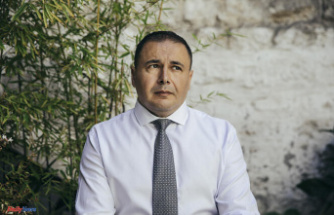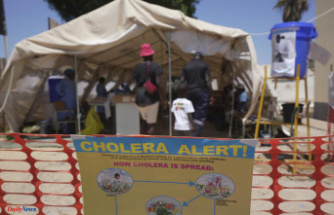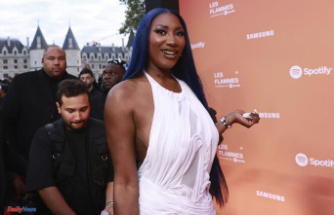Fear is part of life. But we often don't admit it to ourselves because we prefer to think we're strong rather than weak. We should just talk openly about our fears. About the fear of making mistakes, of being alone, of death. Before more wars and disasters. About the fear that we don't see the future as rosy at all, but at the same time don't want to be taken for the last grumpy "scared rabbits". Silvana Koch-Netz, former Vice-President of the European Parliament and founder of an international women's network, has faced more fears in her life than most people. She experienced rise and fall as a politician, lost a child and a career, and had to cope with the shock diagnosis of cancer. In "Now that I'm not dead" Koch-mehrin describes her old and new life and how she managed to deal with the fear. Your book can be a nudge: to what a gain it would be if we knew more about each other, spoke honestly to each other and didn't hide behind facades. That's exactly how she spoke to ntv.de: honestly and openly.
ntv.de: Fear – not an easy topic. They wrote a whole book about it….
Silvana Koch-mehrin: Uli Hauser and I wrote a book of encouragement. I always packed away fears, but in the end no one, including me, can run away from their own lives. Having faced my fear, or rather, having to really confront my fear, meant that I had to find a place for it - because there was no way to avoid it. And that in turn has meant that I no longer have to be afraid of fear. A real learning gift!
When you start dealing with an anxiety issue, don't you wake up a lot of sleeping dogs?
Yes. When I was writing, I also asked myself how much I wanted to reveal about myself. Ultimately, it was very good to work with Uli Hauser, to have him there as a journalist who has devoted his work to a great many very complex human issues. He said to me: "You want to encourage people to be open. Start with it!" He asked where things seemed natural to me. And the fact is that my own stories are also the stories of many other people. What you think is unique, so many others have already experienced.
What was the most difficult topic for you to talk about or write about?
Thousands of women experience stillbirth every year. The pain, the loss of the child, they often deal with in silence. Addressing this topic in the book was not easy because many of my memories were very present again.
The book has become very personal – and it also accounts for the quality, because you feel addressed. But if you read about your fears, you have to expect that your own fears will also be triggered...
I don't know that. We all realize now that we have been able to live very comfortably in our country for many years. With Covid and the Ukraine war, we have all become aware of how fragile this prosperity is. We question more. Much of what we took for granted is no longer so. Example: We have an urgent energy issue and are wondering how much we can heat. We should have dealt much more intensively with the topic of energy consumption long ago. Now we have to. This war creates fears. Especially with young people. Incidentally, for whom it is becoming increasingly difficult to get therapy appointments at all when they need psychological help.
Old certainties are no longer true: We thought that if we only do everything right during the Corona period, wear a mask, get vaccinated, that afterwards everything will be the same as before. But it's not.
It's correct. However, my own experience of "nothing is the same" was my cancer diagnosis. Then everything collapsed for me. What do I do with it now, how do I deal with it? We can become aware of how much power we have within ourselves. And that there is no shame in accepting help. Accepting help has always been very difficult for me.
Help in what form?
For example by a therapist. I always thought, she doesn't know anything about me, how can she help me then? Nobody can understand what's going on with me...
That's what everyone thinks of themselves...
I agree. But you also think: My problems are not so big that I would have to seek psychotherapeutic help. But I'm becoming more and more convinced that - just like cancer screening or dental prophylaxis - there needs to be some kind of mental check-up.
Are we on the wrong track?
We have fixed definitions of what the terms "strong", "powerful", "decisive" should look like. And it's difficult for us to move away from that. But that doesn't get us any further in the impasse we've landed in. Actually, why is it considered weak if we say that we want to think first? Or openly say I don't feel comfortable with it, I'm not well enough informed?
Have women nevertheless made progress in recent decades?
Are we. But it is such an incredibly slow process of change. Feminism is now more than Alice Schwarzer, without downplaying her successes. Feminism is a broad spectrum. But there is a rollback. Every year, the World Economic Forum calculates how long it will take to achieve full equality. And in recent years the trend has been downward again, we are well over 100 years old.
You have your own index in your Women Political Leaders Foundation...
Yes, the Reykjavik Index for Leadership, where Kantar asks people in the G20 countries what they think about women and men in leadership positions, for example. Men are still seen as better suited to be bosses.
The title of your book is not without...
Uli, my co-author, called it an "outburst of courage" when I said the sentence: "Now that I'm not dead" (laughs). He found that this sentence perfectly describes my attitude towards life today. We all know theoretically that we are going to die, but still we often don't appreciate life enough.
When did fear become a companion for you?
When I was diagnosed with cancer, I had to face it. I had to keep putting myself in the hands of others, of doctors, to whom I had practically handed over my sovereignty. The fear of chemotherapy pulled the rug out from under my feet, so I had to deal with my fear. Also with the help of a psychotherapist. Fear doesn't announce itself, it comes when it suits it. But I can influence that it goes away again, that it doesn't spread completely. And I can learn to accept that fear is part of life. That was only possible for me because of the cancer.
You write that you dismantled the fear ...
Yes, I broke her into different parts so she's not that scary. But unfortunately that doesn't always work. Fear is a very independent spirit (laughs). It comes and is triggered in moments when you don't even expect it. What I was able to learn were techniques to help oneself in an acute situation. Realizing that you are not at the mercy, but thinking: "After all, I still have myself, I still exist" - that's how you can face the fear better.
Outsourcing fear is also a possibility, not only in a therapeutic sense. Can others take away your fear?
Talking about it openly definitely helps. Otherwise you just go around in circles.
Is fear a good guide, should you listen to your fear?
I've become more aware. Much has become clearer and clearer to me. A huge part of the whole condition is the fear of fear, which can be greater than the original fear. It's often the great unknown that really scares you. So you should get to know this fear. But fear for others, such as your own children, is something else again.
One chapter of your book is called "Guido", it's about Guido Westerwelle. Do you miss him?
Yes. I know that's not a category to measure it, but I find it so unfair that he had to die so young. He was a friend, a mentor, a great politician, and he was about to start a new chapter in his life. He wasn't done yet.
Are you still scared?
Regulary. But my advantage is that I already know the fear. And I know what she's doing to me. I then observe myself and thereby create distance.
Sabine Oelmann spoke to Silvana Koch-mehrin












